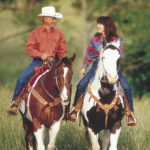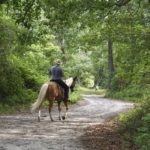Training a horse means setting clear, consistent boundaries. “Fundamentals of Horsemanship” photo.

Sometimes, horses get a reputation of being “dangerous? ?mean,? ?nasty,? “flighty” or ?shut-down?? the list goes on and on.
But just as stereotypes are a harmful mental shortcut in human relationships, these labels limit our thinking and our awareness about how we can help a horse through his issues. It’s almost like a sign has been hung around the horse’s neck, and he doesn’t have a chance to get out of that category and become a solid partner for us.
At my clinics, I often see horses that are described as ?having baggage.? It’s real easy for an owner to start to make excuses why a horse ?can’t? do something. Often, the frame of mind the person is in ? the making of excuses ? is the horse’s biggest obstacle.
Good horsemanship is a lot like life; we can’t change the past, so I don’t think we should dwell on it. But we can make the most of the present and set up the future. Rather than thinking about the past, I find it more helpful to meet the horse where he’s at today.
It’s important not to ignore a horse’s problems when they can be dangerous to us. I’ll be very aware and on my toes as I work with a horse, but I won?t expect there to be trouble. I’ll still ask him these questions: ?Where are you today? What’s the best you have to offer? Here’s where I am today? this is the best I have to offer. Where can we meet?? And we’ll get to know each other.
If we can keep our thoughts in the present, heighten our awareness and really learn to read a horse, then we can help him learn to trust us. Those ?dangerous? horses can become safer and even enjoyable to be around.
By all means, you need to know when it’s time to get help from somebody with more experience. But do have faith.
Your horse wants to be OK with things. He needs to know that you believe in him, that you care about how he feels and that you’ll do your best to help him work through things. Have the same faith in him that you might have in a newborn foal ? knowing that someday, you’ll get there.
With foals, we never doubt that the little newborn will evolve into a good riding or work horse. We have faith that even when setbacks happen in the early learning stages, he will be able to overcome our foibles and turn out to be a good horse and a good friend.
We need to have that same kind of faith in our older horses who have had experiences that can be tough to overcome. With horses who have had some bad experiences due to poor handling, abuse, neglect or accidents it will take longer to regain the trust. But with patience and good timing, it can certainly be done.
Understand that this takes a lot of work, especially with horses that have been mistreated.
It takes clear, consistent and fair boundaries, together with a good dose of empathy and an open mind. I want to come into each day with no preconceived notions, but with an open mind and open eyes.
When I work with a new horse, I see if I can find the holes in his foundation and help fill them in so he can be more solid and trusting. Once the foundation is solid, we can be well on our way.
For example, when the horse gets worried, he should look to the human for support. I want him not to just react, but to think and find me. I’ll be there to show him the way.
And always, I’m having this conversation every time I approach a horse: ?Where are you today? What is the best you have to offer me? I’ll ask you for nothing more than your best. This is the best I have to offer you. I’ll give you nothing less. Now, let?s see where we can meet and what we can accomplish together.?





